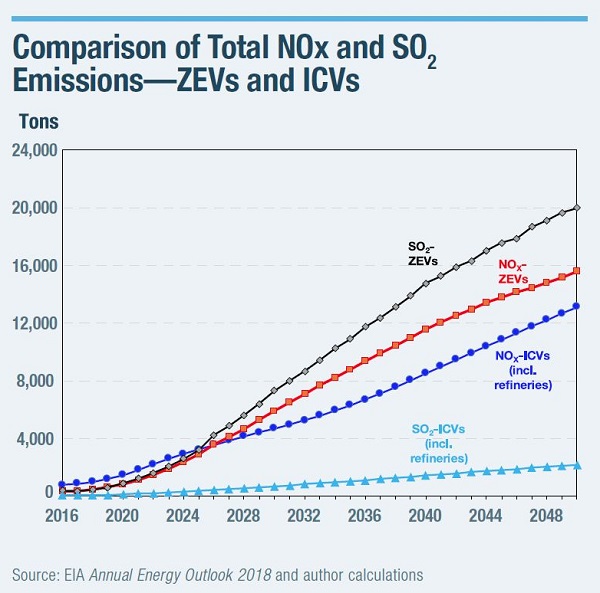By Marlo Lewis of CEI.
"A new report
by economist Jonathan Lesser of the Manhattan Institute challenges the
conventional wisdom that zero-emission vehicles (ZEVs) are superior to
new internal combustion vehicles (ICVs) on environmental grounds. Lesser
also has an op-ed in Politico today based on the study.
Lesser’s analysis is detailed and quantitative but the basic idea is
simple: Zero-emission vehicles are only as clean as the electric power
sources they plug into. Given the electricity fuel mix reasonably
projected by the Energy Information Administration between now and 2050,
both nitrogen oxide and sulfur dioxide emissions from the power plants
supplying zero-emission vehicles will exceed the emissions from new
internal combustion vehicles.
The study also finds that the carbon dioxide emission reductions
achieved by zero-emission vehicles, even if all are powered by renewable
sources, would be too small to detectably affect global temperatures
and thus have no measurable economic value.
In contrast, the costs of federal and state subsidies for
zero-emission vehicles and associated infrastructure are both real and
substantial. “In California alone, the total cost of ZEV subsidies,
including federal tax credits and state rebates for ZEV purchases, as
well as subsidies for private and public charging infrastructure, is
likely to exceed $100 billion,” Lesser writes in his study. Such
policies also raise serious equity concerns, because the subsidies
transfer wealth from lower- and middle-income households to
wealthier households.
From the study’s conclusion:
The newest ZEVs are impressive
technologically. But there is no economic basis for the billions of
dollars spent subsidizing their adoption. The entire premise for
subsidizing ZEVs and the infrastructure needed to power them—reduced air
pollution and lower CO2 emissions—is flawed.
The simple fact is that, because of
stringent emissions standards and low-sulfur gasoline, new ICVs today
emit very little pollution, and they will emit even less in the future.
Compared with new ICVs, ZEVs charged with the forecast mix of electric
generation will emit more criteria air pollutants—SO2, NOx, and
particulates—not less. And although ZEVs will emit less CO2 than ICVs,
the projected reduction in CO2 emissions, below 1 percent of total
forecast U.S. CO2 emissions, will have no measurable impact on climate
and, hence, no economic value.
ZEV subsidies also impose disproportionate
costs on lower-income consumers to benefit higher-income ones.
Historically, ZEV purchasers have had much higher household incomes than
average. Moreover, ZEV purchasers are primarily homeowners, who benefit
not only from subsidies to purchase their vehicles but also from
subsidies to install charging and solar [photovoltaic] (PV) systems.
ZEV purchasers who install behind-the-meter
solar PV reap additional subsidies by not paying the full costs of
providing them with backup power, not paying the full costs for
upgrading local electric utility distribution systems to support their
ZEVs, and not paying the full costs of utility-owned public charging
stations that they can use. . . .
The bottom line is that the economic and
environmental rationales for subsidizing ZEVs do not withstand scrutiny.
These subsidies, along with mandates for ZEV adoption, should be
eliminated."

No comments:
Post a Comment
Note: Only a member of this blog may post a comment.